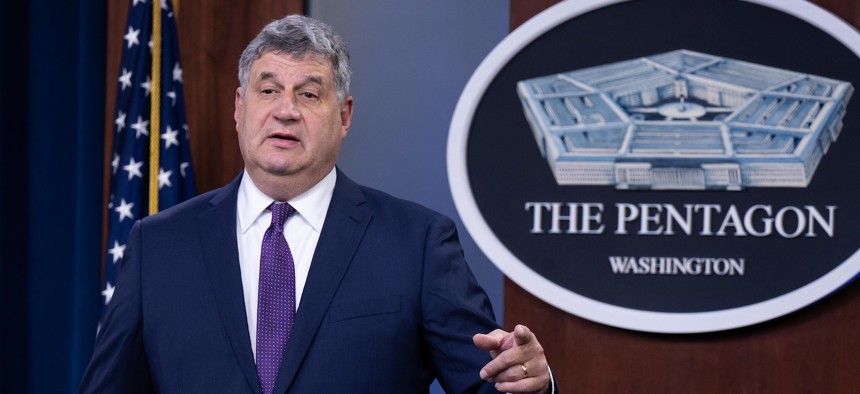
Under Secretary of Defense for Acquisition and Sustainment Bill LaPlante at the Pentagon in 2022. U.S. Navy / Petty Officer 2nd Class James K. Lee
Shutdown would be 'extremely disruptive' to defense production, workforce, acquisition chief says
“Can you imagine if the Chinese had something like this, where their government would shut down every few years?” Bill LaPlante said Tuesday.
A government shutdown could halt munition production and the acceptance of equipment, and may stall efforts that support Ukraine, the Pentagon’s acquisition chief said Tuesday.
“I have some testing work we want to do next week on an item for Ukraine, and unless we can get some type of a waiver—which we're going to get—it's not going to happen,” Bill LaPlante said Tuesday during a Center for Strategic and International Studies event.
With just four full days left in the fiscal year, Congress is still debating 2024 funding bills and considering a continuing resolution, or CR, as a stopgap measure that would keep the government funded at 2023 levels until Nov. 17.
A CR would not allow for increases in munition production without a waiver, and in the past, similar situations have affected the production lines of the Guided Multiple Launch Rocket System and Patriot missiles, LaPlante said.
“If the government shuts down, it's worse. Testing will stop. Acceptance by the government of equipment when it is finished and ready to be accepted can stop,” he said.
During the 2013 government shutdown, the production lines for munitions and the F-35 Lighting II completely stopped, LaPlante said.
“So it's just, it's extremely disruptive. And of course the message it sends to the government workforce.”
The shutdown will affect the U.S. economy—but it also will have implications in the United States’ growing competition with China.
“Can you imagine if the Chinese had something like this, where their government would shut down every few years, and they would freeze their budgets and not start up things for six months? That would probably— we would not view that badly. We could teach them how to do that. That would be helpful,” he said, to laughter from the audience.
The Pentagon has been working with defense companies for more than a year to ramp up production of munitions, as continuing shipments of equipment to Ukraine have depleted U.S. stockpiles. In the last six months, LaPlante said, production of 155mm artillery shells has doubled, and the U.S. will be making 100,000 a month by 2025.
There’s still “work to do” on the munitions that would be necessary in a prolonged conflict in the Pacific, LaPlante said, which is why the Pentagon has been pushing for multi-year contracts for weapons like the Long Range Anti-Ship Missile, and the PAC-3 and SM-6 missiles.
Multi-year contracts are an incentive for defense companies to stay involved in production, LaPlante said, because they provide money up front and are not typically broken. He referenced a chart created by the Joint Production Accelerator Cell that depicts the rise and fall in munition production between wars, going back to the 1990s.
“After 9/11, we almost ran out of munitions in Afghanistan, right around December of 2001,” he said. “So there's a reason that that happens is because we thought we’d buy munitions one year at a time and we assume that we can surge when the crisis happens. And then when the crisis is over, we just lay the people off, turn the production lines off, and go back to where we are. And I'm trying, and others are trying, to change that behavior,” he said.







